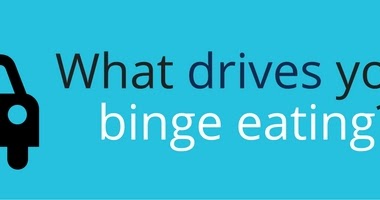Make Peace With Food: What drives your binge eating?
What drives your binge eating?

When it comes to your relationship with food, does
it seem as if you are in the passenger seat, and the driver is completely
out-of-control?
I am going to help you identify what is
“driving” the behavior of binge eating, and give you the two crucial steps to
change, that you can implement right away.
For starters, imagine yourself as a car. If this seems a bit weird, think about
this: we refer to car “bodies” (why is
that?) and we take our cars to the “body shop” for repairs.
As you travel on the proverbial road of life,
keep in mind that you are not alone in the vehicle. There are usually three basic parts to all of us: the Self, the
Critic, and the Soother/Supporter.
· The “Self” is is the part of you that has needs, wants,
wishes, emotions and conflicts. When you say, “I feel
mad/sad/glad/afraid” that’s your “Self” talking.
· The “Critic” informs you of all your perceived
transgressions. It is relentlessly judgmental, critical and sometimes
downright nasty. (Hint: if you
refer to yourself in the second person, it is usually the critic talking, as
when you say to yourself, “You have no willpower!”).
· The “Soother/Supporter” is the part that provides
understanding, soothing and support. Often, that’s the part that can show up
for other people, but not for you.
Which of these is in the
drivers seat?
Chances are, it’s the
critic.
We all need a little bit
of an inner critic to make sure we make good choices. Ideally, that critic should stay in the
backseat – or better yet, the trunk!
How does this relate to food issues?
When the critic is at the
wheel, it isn’t pretty. And for many
people, the critic strikes exactly when they need the most support.
That leads to using food
for comfort or distraction. And then the critic is there to judge you
(“How could you have eaten that?” or “You failed!”), and the cycle
continues.
If you speak to yourself
in a critical way, you feel bad. And if
you don’t soothe and support yourself, you’re likely to use food for comfort or
distraction.
Where is the supporter in
all of this? Probably mute.
Step One: Recognize who’s
driving
Does your internal critic
remind you of anyone you know? Who spoke to you (or to others) in that manner? Where did you learn to relate to yourself
that way?
Is that mean voice really
“you” or does it belong to someone else?
A parent, sibling, or teacher, perhaps.
Identify the source of
that internal critic. And, tell it to
shush. It no longer has permission to
drive you crazy. Banish it to the
backseat.
Step Two: Be a friend to
yourself
How do you express
support for others? Chances are, you are caring, understanding,
helpful and friendly.
What if you spoke that
way to yourself? Try it! You’ll see a difference.
Talk to yourself as if
you were someone you love. Be nice to
yourself. You will feel better, and when
you feel supported by yourself, you are way less likely to eat.
When you are driven by a wish to be supportive and understanding
to yourself, as well as to others, you will stop using food to cope.
And that’s how you make peace with food!

